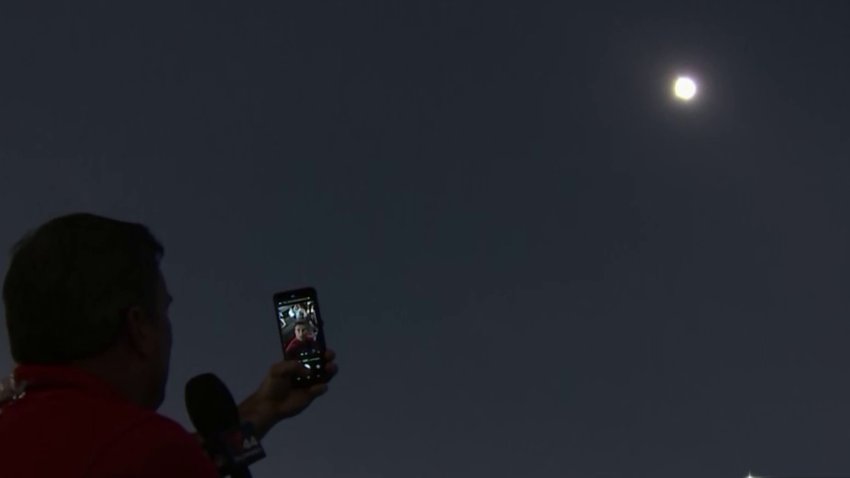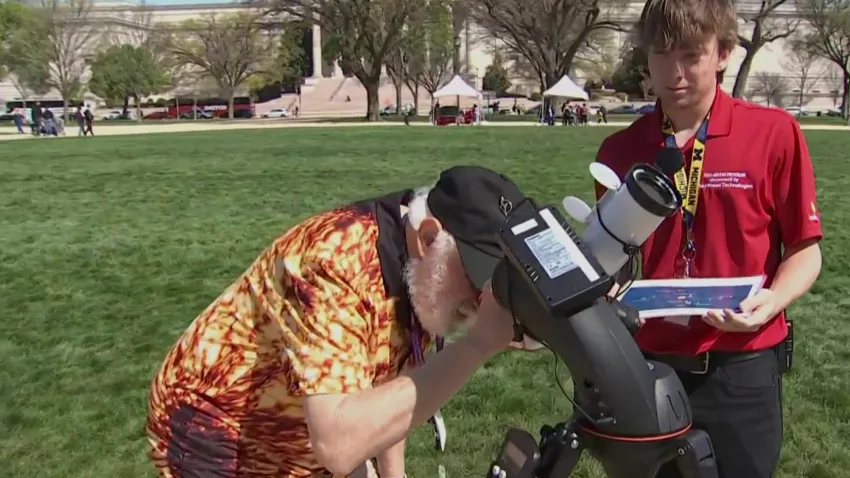-

How to catch the Geminids, one of the strongest meteor showers of the year
The Geminids are among the few major meteor showers to come from asteroids, and this year they will peak on Friday.
-

Earth bids farewell to its temporary ‘mini moon' that is possibly a chunk of our actual moon
Earth is parting company with an asteroid that’s been tagging along as a “mini moon” for the past two months.
-

See the Beaver Moon Friday night, the last supermoon of 2024
Astronomers say better catch this week’s supermoon. It will be a while until the next one.
-

October's supermoon pairs with a once-in-a-lifetime comet for rare nighttime spectacle
The Tsuchinshan-Atlas comet is still in the neighborhood and will wow stargazers in the North Hemisphere after making an appearance in the Southern Hemisphere over the weekend.
-

A rare comet will brighten the night skies in October
A rare, bright comet will be visible in October, clear skies permitting. The comet will make its closest approach to Earth on Saturday.
-

Earth will have a temporary ‘mini moon' for two months
Earth will have a temporary “mini moon” for two months. The mini moon is actually an asteroid about the size of a school bus.
-

Science 4 Everyone: Why does the moon look bigger than it actually is?
On this Science 4 Everyone, Storm Team4 Meteorologist (and Science Teacher!) Ryan Miller explains the mind trick that our brains play on us that makes it seem like the moon is bigger on the horizon than it actually is.
-

How to watch Tuesday's Harvest supermoon with a partial lunar eclipse
No special eye protection is needed to view a lunar eclipse. Viewers can stare at the moon with the naked eye or opt for binoculars and telescopes to get a closer look.
-

Catch a partial lunar eclipse during September's supermoon
Get ready for a partial lunar eclipse and supermoon. The spectacle will be visible in clear skies across North and South America Tuesday night and in Africa and Europe Wednesday morning. A partial lunar eclipse happens when the Earth passes between the sun and moon, casting a shadow that darkens a sliver of the moon. Since the moon will inch...
-

Here's how to watch a quartet of supermoons this year
The first of four supermoons this year rises next week and stargazers could catch a moon that can be 30% brighter than average.
-

August's supermoon kicks off four months of lunar spectacles. Here's how to watch
The first of four supermoons this year is about to rise. Stargazers can catch the first act Monday as the full moon inches a little closer than usual, making it appear slightly bigger and brighter in the night sky.
-

Mars and Jupiter get chummy in the night sky. The planets won't get this close again until 2033
Mars and Jupiter are cozying up in the night sky for their closest rendezvous this decade.
-

The Perseids are here. Here's how to see the ‘fireballs' of summer's brightest meteor shower
The Perseid meteor shower reaches its peak early Monday. Astronomers say it’s one of the brightest and most easily visible showers of the year.
-

Rare double meteor shower event to peak on Tuesday
The Southern Delta Aquariid and the Alpha Capricornid meteor showers will both reach their peak on Tuesday. Here’s what you need to know about the shooting star event.
-

Two meteor showers will flash across the sky around the same time starting this week
There will be back-to-back meteor showers in late July. The Southern Delta Aquariid meteor shower peaks early Tuesday. And this year, it will coincide with a second smaller meteor shower, the Alpha Capricornids. The Delta Aquariids occur every year in North America’s late summer.
-

Northern lights: When we could catch a rare glimpse in the DC area
An unusually strong solar storm hitting Earth produced stunning displays of color in the skies across the Northern Hemisphere early Saturday. News4’s Mark Segraves photographed a colorful sky over the Chesapeake Bay. In Davis, West Virginia, about 160 miles west of D.C., photos shared with News4 show the sky lit up with purple and green streaks. Another photographer sent...
-

A look at northern lights chances in the DC area
Meteorologist Ryan Miller talks about our chances for viewing the northern lights in the D.C. area late Saturday or early Sunday.
-

Solar storm hits Earth, producing colorful light shows across Northern Hemisphere
An unusually strong solar storm hitting Earth produced stunning displays of color in the skies across the Northern Hemisphere, with no immediate reports of disruptions to power and communications.
-

‘Here we go!' Doug Kammerer reports as eclipse plunges Indianapolis into darkness
News4’s Doug Kammerer reports as the 2024 eclipse reaches totality in Indianapolis, Indiana.
-

‘Very cool': Excitement builds for solar eclipse in DC
Thousands of people are expected to view the partial solar eclipse on the National Mall in D.C. News4’s Megan McGrath reports on what to know.

